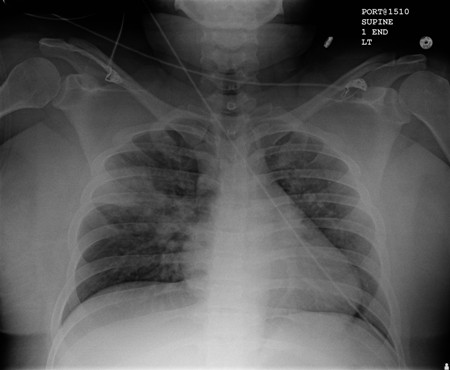Resumo
Definição
História e exame físico
Principais fatores diagnósticos
- presencia de factores de riesgo
- tos
- disnea
Outros fatores diagnósticos
- fiebre
- dolor torácico pleurítico
- taquipnea
- aliento fétido
- crepitaciones
- esputo purulento o espumoso
- antecedentes de vómitos
Fatores de risco
- quimiorradiación en cánceres de cabeza y cuello
- alteración del estado mental
- disfunción en la deglución
- enfermedad gastrointestinal
- intubación o sonda de traqueostomía
- edad avanzada
- higiene bucal deficiente
- sonda de alimentación
- posición en decúbito
Investigações diagnósticas
Primeiras investigações a serem solicitadas
- saturación de O2
- radiografía del tórax (RT)
- hemograma completo (HC)
- tinción de Gram del esputo
- cultivo de esputo
Investigações a serem consideradas
- ecografía pulmonar a pie de cama
- GSA
- broncoscopia
Algoritmo de tratamento
todos los pacientes
Colaboradores
Autores
Michael J. Lanspa, MD, MS
Adjunct Associate Professor
Division of Pulmonary and Critical Care Medicine
Intermountain Medical Center
University of Utah
Salt Lake City
UT
Declarações
MJL declares that he has no competing interests.
Agradecimentos
Dr Michael J. Lanspa would like to gratefully acknowledge Dr Richard Kanner and Dr Krishna Sundar, previous contributors to this topic. DK and KS declares that they have no competing interests.
Revisores
Toby Maher, MB, PhD, MRCP
Consultant Respiratory Physician
Department of Respiratory Medicine
Royal Brompton Hospital
London
UK
Divulgaciones
TM has received research funding from the Wellcome Trust and GlaxoSmithKline. He has acted as a paid consultant to GSK, Actelion, and Respironies.
Feras Hawari, MD
Chief of Pulmonary and Critical Care
King Hussein Cancer Center
Amman
Jordan
Divulgaciones
FH declares that he has no competing interests.
Agradecimiento de los revisores por pares
Los temas de BMJ Best Practice se actualizan de forma continua de acuerdo con los desarrollos en la evidencia y en las guías. Los revisores por pares listados aquí han revisado el contenido al menos una vez durante la historia del tema.
Divulgaciones
Las afiliaciones y divulgaciones de los revisores por pares se refieren al momento de la revisión.
Referencias
Artículos principales
Metlay JP, Waterer GW, Long AC, et al. Diagnosis and treatment of adults with community-acquired pneumonia. An official clinical practice guideline of the American Thoracic Society and Infectious Diseases Society of America. Am J Respir Crit Care Med. 2019 Oct 1;200(7):e45-e67.Texto completo Resumen
American Society of Anesthesiologists. Practice guidelines for preoperative fasting and the use of pharmacologic agents to reduce the risk of pulmonary aspiration: application to healthy patients undergoing elective procedures: an updated report by the American Society of Anesthesiologists Task Force on Preoperative Fasting and the Use of Pharmacologic Agents to Reduce the Risk of Pulmonary Aspiration. Anesthesiology. 2017 Mar;126(3):376-93.Texto completo Resumen
Kalil AC, Metersky ML, Klompas M, et al. Management of adults with hospital-acquired and ventilator-associated pneumonia: 2016 clinical practice guidelines by the Infectious Diseases Society of America and the American Thoracic Society. Clin Infect Dis. 2016 Sep 1;63(5):e61-e111.Texto completo Resumen
Artículos de referencia
Una lista completa de las fuentes a las que se hace referencia en este tema está disponible para los usuarios con acceso a todo BMJ Best Practice.

Diferenciales
- Neumonitis por aspiración
- Atelectasia
- Edema pulmonar
Más DiferencialesGuías de práctica clínica
- Pneumonia in adults: diagnosis and management
- Stroke and transient ischaemic attack in over 16s: diagnosis and initial management
Más Guías de práctica clínicaFolletos para el paciente
Neumonía
Más Folletos para el pacienteInicie sesión o suscríbase para acceder a todo el BMJ Best Practice
El uso de este contenido está sujeto a nuestra cláusula de exención de responsabilidad